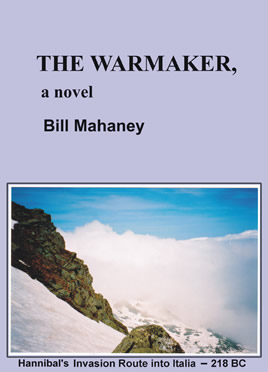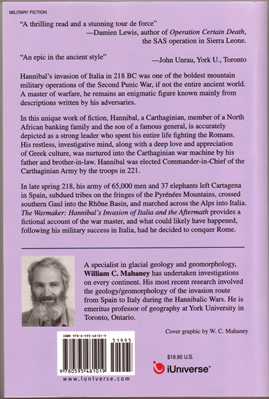 |
| The Warmaker Prologue |
|
Available at Amazon.com
|
by Bill Mahaney PASSAGE: 218 BC Trago mounted a small rise in the valley floor and scanned the riverbed and surrounding slopes, studying the topography. His troops came up behind him. They too strained to take in every bend in the stream, every change in slope, looking for three scouts who formed the vanguard of their reconnaissance squadron. Trago looked at his men and could see fear in their eyes, fear from the unexplained absence of his scouts and fear of the high peaks, which rose up to meet Baal, the great Carthaginian God. Trago took one last wide look at the valley. He was about to motion his men forward when he caught a reflection from the slopes to the north, a brief streak of light brought about by the slow rise of the sun on metal. Trago motioned his men to advance cautiously and took the lead, guiding his horse along a terrace in the direction of the reflection. A clear form took shape, a body lying ahead with a javelin clear through the torso. Looking about this unfamiliar terrain, Trago spurred his mount forward in unison with the rest of his men. Dismounting, he could see Vero, one of his ablest scouts dead, pierced through with a Gallic spear. Not wishing to be surprised by the Gauls he motioned his men to spread out in a defensive perimeter. He said nothing, eye contact being sufficient for his men to know what to do. He led his horse to a stand of trees where he tethered the animal to a tall pine. His dark eyes grew hard and steely, sunken in a deeply tanned face, his skin stretched tightly over narrow cheekbones. He had a hard face, one few men would dare affront, which contrasted with a calmness borne of self-assurance. He scanned the surrounding hills looking for an enemy that had faded into the wilds and noted his men were now well positioned to ward off any attack. Vero, a competent battle-hardened veteran of Hannibal’s army, was a man not easily tricked. Yet, he had been ambushed, and the two men with him likely taken prisoner by these wily Gauls, who had shadowed his party for days. Hannibal had been right, Trago thought. These mountain people, like their lowland cousins, would prove tricky, even deceitful in their dealings with foreigners. Like the Celtic lowlanders and their Celtiberian relatives to the south, one had to watch them for they lived only to plunder and rob. Behind him a young cavalryman, Trago’s courier and bodyguard, eased out of the trees wearing an oiled deerskin jacket and pants. Watching Trago stare at his fallen comrade for what seemed like a minute, the young soldier turned to scan, the surrounding hills for sign of the enemy and trouble. Sensing none, the soldier voiced his concern. “Trouble, General?” “Most probably. We’ll soon find out.” The bodyguard watched Trago’s face slowly harden, his sunburned creased skin folding into alternating lines deepened by light to dark tonal contrasts. He had seen his general deep in thought before but never with a countenance that seemed to indicate he was fighting to control his rage. Vero was Trago’s ‘right hand’ countless times, on missions involved with training or reconnaissance deep in enemy territory. And now he had been ambushed while leading scouts ahead of the main party. Revenge will likely top the agenda now, he thought. But to his amazement Trago seemed to fall into a momentary trance slowly regaining his usual non-committal expression. After watching the surrounding hills for sign of movement, Trago sat down next to his fallen comrade and looked at him for several minutes. He loosened the javelin in Vero’s chest. And pulled it free. While his courier listened, Trago talked to his fallen companion, more or less as if he were still alive, recounting many experiences they had shared over the years. Abruptly, Trago rose and pulled his sword, saluted his fallen companion and thrust the weapon deep into the soil. “You’ll be avenged, my friend as soon as we find your comrades.” The cavalrymen gathered round Trago and Vero and gazed across the rolling hills where the serpentine river stretched ever upwards, reaching toward the divide that separated waters flowing into Italia from southern Gaul. Staring at Vero’s corpse, Trago suddenly sensed movement in the grass and noticed a marmot. The animal was standing erect, every bit at attention, watching him and his men. He watched the marmot for what seemed a long time and noticed his men had turned to watch the animal. Finally, cocking his head, Trago thought, what are you doing up here? The marmot cocked his head as if to ask the same question and scampered away, weaving and dodging around tufts of tall grass. Trago watched as the furry creature disappeared into a hole. He smiled and looked again at his fallen comrade. He would bury Vero near the marmot hole in the same terrace where the marmot lived. Wild animals held a special place in the pantheon of life and even Carthaginian priests would not offer them up for sacrifice, preferring humans instead. The marmot would guard Vero and guide him to the afterlife. The courier didn’t say anything and Trago didn’t wait. He picked Vero’s still warm body up in his arms and carried him along the terrace to a place where beds of coarse sand and gravel would make it easier to dig a grave. Using his knife, he whittled a crude shovel out of a tree branch. Rather satisfied with his tool making, he looked at his fallen trooper with somber eyes. Vero lay face up on the flat expanse of ground, still neatly dressed in his cuirass, his scabbard empty, eyes wide open. The Gauls had taken his sword and dagger as spoils of battle and without doubt Vero saw the lance coming that would kill him. He may have taken it to shield his men. Such was the way in which Carthaginian soldiers protected one another. Without proper tools, a grave could only be dug with crudely fashioned sticks and by hand, with the aid of a short sword and crude shovel that Trago had whittled from a fallen branch. It took a couple of hours to dig a shallow grave and perform a short service allowing Vero entrance into the afterlife. In Numidia he would have been buried in the crest of a massive dune to reflect his station in life and to assist his passage to meet his ancestors. Trago only hoped Baal would speed his journey to the outer world, a place where they were all destined to reside for eternity. Soon, his scouts returned and reported finding tracks, which led along the high ridges to the south. Reading the trail they realized the two missing men had been taken prisoner and dragged through the grass. Not wishing to leave their comrades to a horrible fate, Trago led his men up-valley intending to catch the fleeing Gauls. Following spoor deliberately left behind by the captive Carthaginians, Trago and his troopers tracked the Gauls and captive troopers higher into the tundra. They entered a world unlike any they had seen before, complete with short, gnarled pines, abundant herbs and wild flowers. In a short time the Carthaginian scouts dismounted within sight of a small Gallic encampment, a seasonal habitation used by shepherds and hunters. Taking stock of the situation they could see their two scouts tied to posts in the center of the camp. The men were being prodded and whipped as the Gauls tormented them, a long process that most certainly would end in their deaths. In the center of the Gallic camp three wolves roamed a small cage, snarling and whining, most likely sensing the coming slaughter. As Trago watched the scene unfolding he wondered if the Gauls intended on feeding the dying Carthaginians to the caged animals. Whatever the Gauls had in mind he had no intention of leaving his men alive to face an ignominious death of slow torture. Thirty-five Carthaginians, even battle tested troops, could not rush and take this hamlet no matter what tactical surprise was in their favor. Trago motioned to his best archers and indicated they would kill the two scouts rather than leave them to a slow death by torture. At his signal the group mounted and rode along the crest of the ridge, distracting the Gauls below, causing them to stand bewildered at the sudden appearance of foreigners. All the Carthaginians let loose a fusillade of arrows; the two best archers killing their comrades instantly, while the others scattered the Gallic warriors, wounding and killing some in the process. Trago quickly ordered a fallback out the same way they had come in. He had seen enough and it was time to beat a hasty retreat to Iberia to report to Hannibal. The invasion route to Italia would not be easy but it could be done. It should be done to bring the thieving Romans to heel and allow Carthage to assume its rightful place in the Mediterranean. The Gauls, however, were another matter and their presence would require a change in tactical planning to effect passage into northern Italia. |
||

